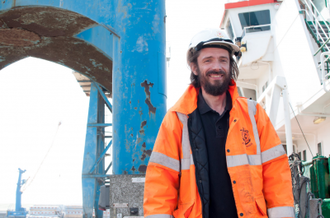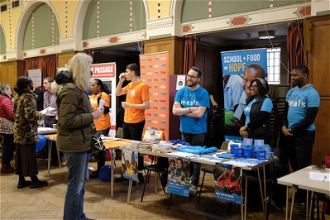Ukraine: Stella Maris chaplain on impact of war on seafarers

Fr Alexander Smerechynskyy
Source: Stella Maris
Fr Alexander Smerechynskyy, national director of Catholic charity Stella Maris Ukraine, and port chaplain to Odessa, explains how the war with Russia has affected seafarers.
As the war and suffering in Ukraine continues, there are around 80 ships and 400 seafarers stuck in Odessa, Illychyvsk, Yuzhny, and other ports on the Black Sea coast. This is a very difficult situation not just for the seafarers, who come from all over the world, but also for their families.
Despite the UN Black Sea grain initiative announced in July, which created a safe corridor for ships carrying Ukrainian food and fertilizer to sail to other parts of the world, many vessels cannot leave because the Black Sea, along with the Sea of Azov, has been mined, and there is also the risk that they might be attacked by Russian forces.
I have been on board ships and spoken to seafarers from China, India, Indonesia, and many other countries. I met several Russian seafarers who told me they were afraid to be evacuated because of the fighting.
Stella Maris Ukraine has been trying to provide whatever help it can to seafarers and their families since the start of the war. In the first few months my assistant port chaplain, Rostik, volunteers, and myself helped some of the wives and children of seafarers to get to the Polish border. It was very difficult to find transport., and the journeys were dangerous because we passed near Russian army positions.
One woman and eight members of her family had spent 17 days under fire in Balakleja in eastern Ukraine. For the last three days they sheltered in a basement without water, food, electricity, or any way of contacting anyone. They were terrified. All the neighbouring villages were destroyed by bombs. They escaped through a green corridor the town's mayor had established, crammed into one car.
It took four days to reach the Polish border, which they crossed on foot, and they were taken by bus to a Stella Maris centre in Gdansk, which provided emergency accommodation, food, clothing and SIM cards. The children were either given places in schools or had online lessons.
Some Nigerian sea cadets studying at Kherson Maritime University contacted us for help. They were evacuated to Lviv, where we provided humanitarian aid and financial assistance and we stayed in touch with them online.
In the first two months of the war we had a hundred ships blocked in Odessa and other ports. We provided food and medicine. The captains of the ships in the port of Nikolai were very afraid because they could see and hear explosions taking place.
Odessa is the largest port in Ukraine and it has the biggest navy base. Russia has fired missiles at it. On one occasion, a tanker ship was hit and caught fire. Thankfully, there were no crew on board at the time.
Ukrainian seafarers can't leave Ukraine to join ships elsewhere because of martial law, which is imposed on men between 18 and 60. Some have been without work for a year. The situation is really hard for them. I know seafarers who haven't been able to work for a year, which means they can't earn money and support their families.
So far, Stella Maris has provided 150,000 euros to 300 families of seafarers. We would like to provide more financial help, but our resources are limited.
We helped implement a mother and child social programme and arranged for a large group of seafarers' families to go to Romania for a summer vacation.
Russia's blockade of the Black Sea has highlighted the vital role seafarers play a vital role in the global supply chain. They are responsible for goods being delivered to shops and supermarkets. Ukraine has a long and proud history of seafaring. In Odessa everyone knows someone who is involved in some way with seafaring.
When we were first attacked by missiles and bombs, we were all afraid. But now it has become part of everyday life, unfortunately. I would estimate that about ninety per cent of people have mental health problems. The war has destroyed buildings and roads, but it's also damaged many people psychologically. It's a huge problem.
This is why, with the help of Stella Maris in the UK, we have launched the Stella Maris Seafarers Support Service, which will provide medium to long term support from professional psychologists in Ukraine. There is an urgent need for this, as many seafarers and their families have experienced traumatic events and some have lost everything. We hope that counselling will help them to rebuild their lives.
Odessa is still being attacked by missiles and bombs. We don't know when the war might end. We live one day at a time. We don't know what will happen tomorrow or the day after. But Stella Maris Ukraine will continue to provide whatever help we can to seafarers and their families. And we will continue to pray for an end to this terrible violence that has destroyed so many lives.
Please pray for seafarers and families impacted by the war in Ukraine, and consider supporting them, thank you.
LINKS
Stella Maris Ukraine - www.stellamaris.org.uk/ukraine-response
Stella Maris - www.stellamaris.org.uk


















